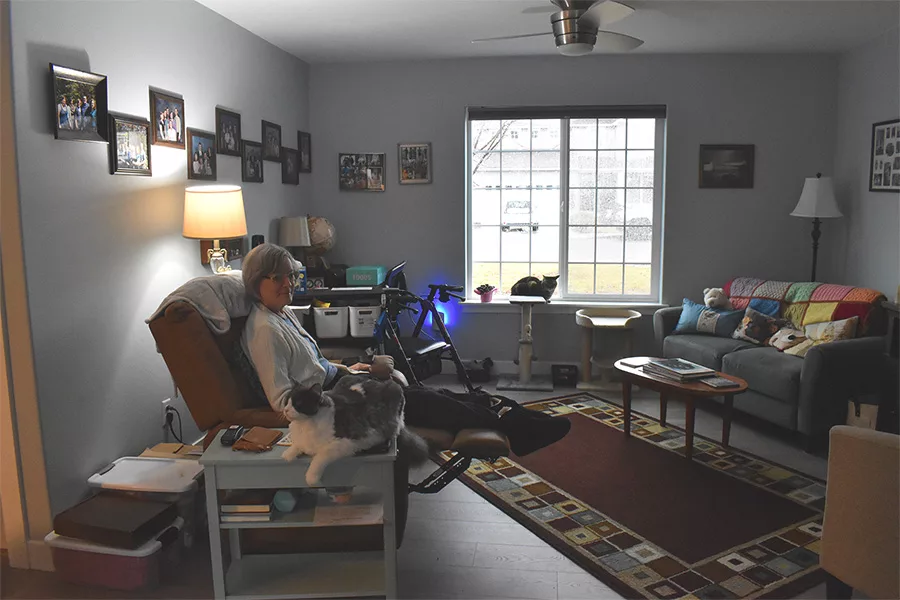
Home » Tiny homes may not solve the housing squeeze but they’re a start
Tiny homes may not solve the housing squeeze but they’re a start

Jane Robison, 69, sits with her two cats, Charlie and Tucker, in her attached tiny home in Pasco. Her daughter added the attached dwelling unit this July, and she's not the only one pursuing ADUs as housing options.
December 13, 2024
Elizabeth Chambers of Pasco knew that her mother needed more constant care and had looked for a few years for a housing situation that would work, but nothing panned out.
That’s when she started thinking about an accessory dwelling unit as an option.
The idea was that “she could live with us, but without being in my house,” Chambers said.
Sometimes called mother-in-law suites, ADUs are typically smaller housing units on the same property as a home. They can be attached or detached.
It’s been more than a year since a state law passed to encourage more ADUs as a housing option, and some of the Tri-Cities have been seeing more interest in the little homes.
While restrictions governing ADUs have loosened in some cities, in accordance with the state law, others have yet to see the effects.
Since January, permits for ADUs have been issued throughout all of the Tri-Cities, as well as Benton City, Benton County and Franklin County.
Living near family
Jane Robison, 69, moved into her ADU in July, along with her two cats, Charlie and Tucker.
“It’s just the right size,” Robison said.
The tiny home has its own exterior door as well as an interior door connecting it to her daughter’s house. From the outside, the transition from home to ADU is seamless.
Robison said it wasn’t what she had planned for retirement years, but she’s grateful that her daughter and son-in-law stepped up to take responsibility.
It’s been good being near family, she said, since otherwise she might have spent a lot of time alone.
Chambers, who homeschools her children, likes the multigenerational aspect.
“I think it’s been probably really great just for my family, as far as the kids having their grandma around more and her having the younger kids around more, interacting on a daily basis,” she said.
She also can see the micro home as being useful in the future, when her kids are old enough to live on their own but aren’t ready for a full apartment.
Micro investment options
Eric Mendenhall, West Richland’s community and economic development director, said that most of the permits he’s seen for ADUs are typically focused on housing a family member.
But that’s not the only option for these housing units.
“I’ve also seen them used for additional income, where they can build this, have a unit there where individuals can rent or live, and they’re an affordable option for individuals,” he said.
Kennewick’s planning manager, Steve Donovan, said he’s seen the interest in renting out ADUs pick up as the new regulations have been put into place, a shift from more family-driven interest.

Elizabeth Chambers, left, enjoys the multigenerational aspect of having her mother, Jane Robison, in an attached ADU, she said. ADUs are often used to house family members, though they can also be rented out for additional income.
| Photo by Rachel VisickCode changes
Washington enacted a law last year that would change several standards regarding ADUs.
Under the new regulations, two ADUs are allowed on lots that meet certain requirements; cities may not require ADUs to be smaller than 1,000 square feet; and the property owner does not need to live on the lot, among other changes.
But just because the law has changed doesn’t mean that all city codes are up to speed just yet. Cities aren’t required to implement the changes until their next comprehensive plan update. These 20-year plans guide future growth.
Pasco updated its code to be more lenient a year prior to the state law change, with revisions including allowing detached ADUs, removing the owner occupancy requirement and allowing more flexibility in the aesthetic design of small homes.
While Pasco hasn’t seen hundreds of them popping up, there’s been a clear increase since the city changed its codes, said Jacob Gonzalez, land use and planning advisor for Pasco. It’s shifted from less than 10 a year, to 16 in 2023, and 14 through September 2024.
The numbers may be small, but they’re substantial, he said. That’s “12 households that now have another option for housing whereas three years ago it wasn’t there. And so I think that’s something that we should be excited and proud about,” Gonzalez said.
Some changes, like allowing two ADUs per lot, still need to be made. Gonzalez said that the city will need to comply with the state law before the end of 2026.
Kennewick has already made its code changes, which went into effect in October 2023.
While Donovan said that there’s been an increased interest in ADUs, it’s hard to see in numbers because the city doesn’t have a way of tracking the permits. Previously, Kennewick required a planning permit for ADUs. Now, it only needs a residential permit, which doesn’t distinguish between a house or an accessory unit, Donovan said.
Richland and West Richland won’t be updating their comprehensive plans until 2026. Residents of those cities can still apply for a permit for an ADU, but it will be under the cities’ current codes.
“You’ll have to meet today’s standards,” Mendenhall said. “If they want a little more loose standards, less strict standards on some of these requirements, they can wait until it’s been adopted.”
More housing options
One of the reasons for increased leniency in ADU regulations is to improve housing options.
Donovan said it seems to have been a positive move.
“It’s just another option and the more options available, the less difficult it is to secure housing,” Gonzalez said. It’s also a housing option that gives the homeowner a lot of freedom of choice, he said.
But ADUs won’t singlehandedly solve housing issues, Mendenhall said. They’re only “one of many tools that need to be employed for affordable housing,” he said.
ADUs help to build up housing density, which comes with a share of new difficulties, Donovan said.
That could include more cars on the streets. Kennewick requires ADUs to have one off-street parking space in addition to the two off-street parking spaces already required for the main lot.
In favor of offering more flexibility, Pasco doesn’t have off-street parking requirements. Gonzalez said those requirements would make many projects ineligible “because where are you going to find that new space?”
Permitting process
For those looking to get an ADU of their own, the first step is talking to their city or county’s planning staff. Pasco also offers a simplified user’s guide to ADUs that is available online and in-person.
Donovan described the process as no different than building a house. The same inspections and permits are required.
He also cautioned that it’s not as easy as it used to be to convert a garage into a livable space. Energy codes and other standards must be followed.
Often, Donovan said, it’s easier to build an ADU from scratch.
For Chambers, the process was smoother and faster than others might experience because she knew who to contact and managed everything herself.
When she had her home built 15 years ago, Chambers worked for New Tradition Homes, which built the home. That’s who she called when it was time to add the ADU, too.
“My job actually included things like getting permits for the new construction and dealing with inspectors and things like that. So when we had this idea, I just called my old boss and said, ‘Is this a stupid idea? And what do I do?’ And so he helped me … with the plans and with the permit process,” she said.
She said that it may be hard for others to find contractors with time for smaller jobs like building an ADU. Throughout the process, the city and inspectors were helpful, Chambers said, and after getting the permit in March of this year, the ADU was move-in ready by July.
Latest News Real Estate & Construction Local News
KEYWORDS December 2024
Related Articles
Related Products





